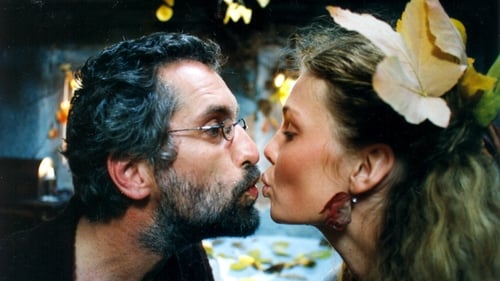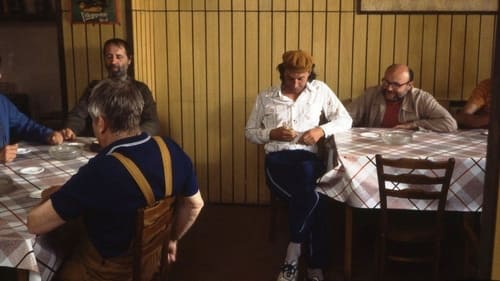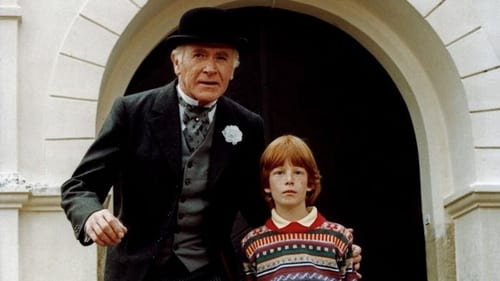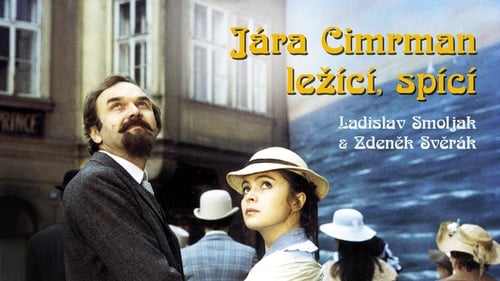
Šťastný člověk
Tůma's film is a sovereign cinematographic space, which, broken up into many chapters, takes an unconventional look at contemporary Czech society. The opening political grotesque on the election of the President is drowned out by the ecstatic ramblings of philosophising (and chattering) fragments turning on the sought-out axis of life and the world, and especially the inward-looking images full of colourful objectivity and charming humour that is elevated to the level of pure poetry.

A 50 year old journalist, son of a civil war hero, who died fighting for the right forces is shattered, when he recognizes him in a documentary, fighting for the communists. He starts searching for the truth, despite his family's objections, who fear that they will lose privileges if the status of the dead changes after the search.

včelař
A computer programmer and his son are going out of the city for vacation.

Jan Zach
Alice Nellis's small-scale debut tragicomedy spotlights small-town elections. The protagonist, a university student name Jana (Theodora Remundová) who is trying to solve a troubled relationship with a married man, takes her mother's place on the election commission. In the meantime the mother (Iva Janzurová) is going through her own small domestic crisis with her husband (Leos SucharÃpa). Thanks to excellent acting performances and restrained direction, the film convincingly outlines interpersonal relations and their light social overtones.

Jevgenij Dorn

Doctor
The story, written by former George Stransky former political prisoners and today's chairman Pen Club is situated to 50 years and uranium camp of political prisoners in Pribram, where after the fall of the Stalinist cult comes at the end of 1958 as a prisoner of the former Chief of Main Administration of correctional facilities Colonel Good. Former chief topic of coexistence, "a guard" and political prisoners in the Bolshevik camp served timeless makers to reflect on the possibility (or impossibility) of forgiveness and a sense of justice. The film, unfortunately, below expectations - mainly because of its rarity and lack syžetovou arching dramatic arc of the story, including natural gradation. Nice camera and vice versa are cast, formed literally myriad of top Czech actors. A representative of one of the main roles - Jiri Schmitzer in 1997 was awarded the Czech Lion.

Dr. Široký
Bohus is indolent and spends his days drinking brandy. One day he finds he has inherited a brickworks, several shops and a five-star hotel. Bohus sets out to tour his new empire, insulting everyone on the way.

Art Historian
A commemorative and essayistic meditative piece on the Prague quarter Libeň during the 1950s.

Public Prosecutor
Один из самых именитых чешских режиссеров снял заведомо непроходной фильм - крайне жесткую сатиру на тогдашний коммунистический режим. Фильм пролежал на полке 20 лет, вышел на экраны лишь в 1990 году и получил восторженные отзывы критиков. По роману Богумила Храбала. Прага начала 50-х. Действие фильма происходит в трудовом лагере. Разношерстная команда рабочих, среди которых и профессор литературы, и повар, и несколько женщин-заключенных, открывает в себе солидарность после того, как двое молодых людей влюбляются и решают пожениться. Они готовятся к свадьбе...

lord Canterville

Pan Tau, the friend of all children, now also helps the adults.
A movie producer is in trouble and decides to shoot another Pan-Tau movie. But the old Pan-Tau actor Karasek is no longer young enough to walk the almost weightless walk of Pan Tau.
Mr. Novak turns up - he resembles Pan Tau like a twin brother. He succeeds every pirouette. And as if by magic, he solves all the problems between people! Who is Mr. Novak? Is he really ...?

Fabián

Eiffel
Czechoslovak comedy film directed by Ladislav Smoljak, about the fictional national hero Jára Cimrman (universal genius, inventor, sportsman, criminalist, poet, writer and philosopher).

faun
A bachelor named Faun with a Don Juan complex, seized with a hypochondriac's fear of the ineluctable approach of death, enters a race against time's passage. Faun's sexual love is imbued with the narcissistic vanity of a self-satisfied bacchant who even towards old age can't manage to forgo his lifelong pose as an irresistable seducer of women. He desperately searches for meaning in superficial, fleeting sex.

Blasius, robot BLS 5003
Ten-year-old Frantisek is traveling to Leipzig to visit his German friend Egon. On the train, he shares the compartment with three men. One of them, the bearded, hefty Blasius is polite but at times acts very confused. At the end station the two boys meet, but they must first of all get rid of Blasius, who lifts them up together with their luggage and carries them away. Leipzig is packed with tourists who have gathered for the famous Fair. The eccentric bearded fellow deals effectively with the traffic jam in front of the station. Blasius's fellow travelers from the train - inventors Prantl and Pirwitz, are at the fairground, boasting of their new invention and claiming it to be the greatest surprise of the entire Fair.

The harsh reality of a home for abandoned children blends with episodes of youthful fantasy and slapstick comedy in this story of an orphan girl. Lucy's fondest wish is to find new parents and leave an orphanage. She befriends a man who can create doors from paint. He gives her a stuffed dog that magically comes alive when placed on the ground, and he and his wife end up adopting the little girl. After finding parents of her own, Lucy sets out through fantasy to find parents for her orphan friends. All of the people Lucy meet during her remarkable make believe wanderings end up taking children home.


Tadeáš
Lemuel Gulliver (Lubomír Kostelka) has had a car accident and continues his journey across the unknown countryside on foot. On the road he finds a dead rabbit dressed like a man and takes a watch from its waistcoat breast pocket. The half-ruined house that he enters reminds Lemuel of his childhood and brings up a painful memory of a dearly loved girl Markéta who was drowned years ago. Gulliver finds himself in Balnibarbi, a country where he doesn't understand the laws and habits and so continually offends against public decency. It is a day when people are ordered to keep their mouths shut and they force their visitor to follow suit. He faces harsh interrogation and finds it difficult to explain that he is not the rabbit Oscar whose watch has been found in his possession.

More than twenty years after the Second World War, a mining engineer named Fischer is revealed as a former member of the Gestapo, Karel Kraus. He is sentenced for murder to eight years in prison and now works with other prisoners on the renovation of the Convent of St Agnes of Bohemia in Prague. Then a car with a foreign registration begins to park regularly close to the construction site. Its crew, a man and a woman, contact the construction foreman, who probably would not reject a bribe offer to perform some service. The prisoner Bicík is appointed to work with Kraus; Bicík gives him a message from Kraus' brother Bert, who lives abroad, that he wants to help him escape.

Otec Nataši
Five Girls Around the Neck, in 1967, set out to explore that critical age of adolescence when a person's character is formed for good or evil. Schorm examined a girl's problems of being giving too much. She tries to buy the goodwill of her less fortunate friends; her intentions are pure, but in the difficulty of communicating she learns envy and deceit, and must decide if she will submit to double dealing or steel her life against self-deception and mediocrity. In addition to the relationship between the girl and her friends, Schorm introduces a teenage romance and the broader relationship between the girl's parents - neatly tied together with segments of Weber's opera "Der Freischütz". He reveals himself as a skilled psychological director with a wide range of knowledge about people.

Сотрудник проектного института инженер Ян Шебек по неизвестным причинам совершает попытку самоубийства. Пребывание в психиатрической лечебнице должно подготовить его к дальнейшему существованию среди «нормальных» людей.














